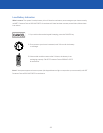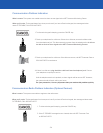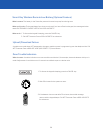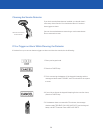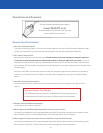
Questions and Answers
General Use of the System
1. How can I avoid false alarms?
Take a look at the tips on page 2. If you have any further questions, you can visit the False Alarm Reduction page
on ADT.com (www.ADT.com/home-security/learning-center/security-topics/false-alarm-reduction).
2. Do I need an alarm permit?
Alarm permit ordinances vary from area to area. Please contact your local emergency response agencies
or your city or county government to determine whether a permit is required in your area. It is your re-
sponsibility to obtain the permit, pay any associated fees and inform ADT of your permit number. In some jurisdic-
tions, however, ADT must obtain and submit the permit application for you, and will then bill you for the permit and
processing fees.
If a permit is required in your area and you do not have one, emergency agencies may choose not to respond to
an alarm at your home or business. In addition, false alarm fines are generally much higher for systems lacking
permits.
3. How often should I test the system?
You should test the system at least once a month. Follow the test instructions beginning on page 25 of this
manual.
4. Should I clean the smoke/heat detector?
Yes. Follow the instructions on page 38.
5. What happens if I add DSL (Digital Subscriber Line) service to my home?
Converting your telephone line to a high-speed data format like DSL can affect the ability of the system to report
alarm conditions to ADT’s Customer Monitoring Centers. See page 46 for more information.
6. What happens if I switch my phone service to VoIP (Voice over Internet Protocol)?
Converting your telephone line to a high-speed data format like VoIP can affect the ability of the system to report
alarm conditions to an ADT Customer Monitoring Center. See page 46 for more information.
Visit the Frequently Asked Questions page of
www.MyADT.com
for more answers to the questions you may have
about the ADT security system.
41
Important Notice: Test Monthly
Your Residential Services Contract (or Small Business Contract) requires you to
conduct these tests at least once a month. Weekly testing is recommended.



